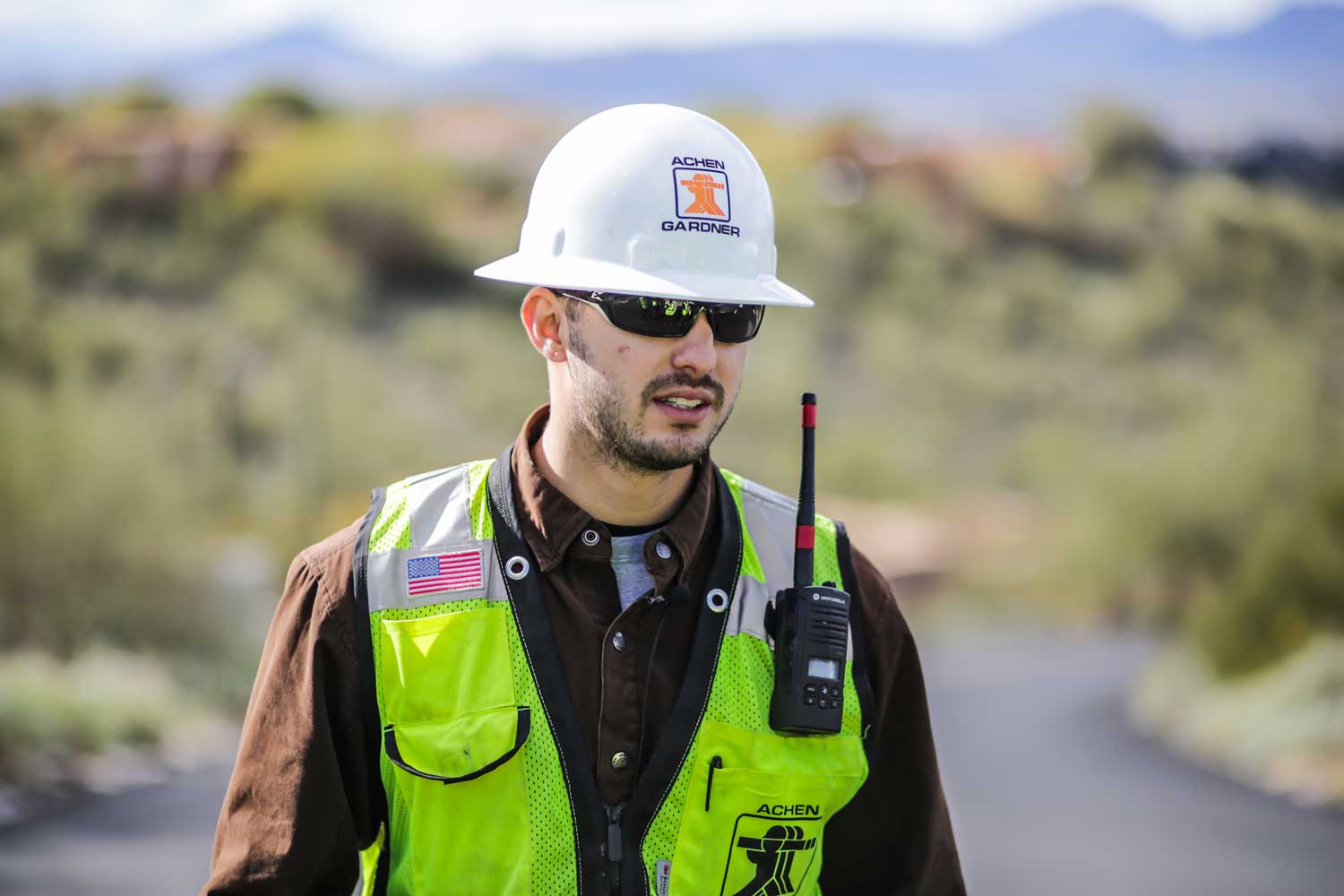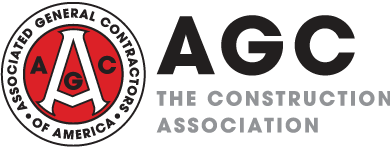
I met Cameron Bonner, a 27-year-old foreman with Achen-Gardner Construction, during a visit to a job site in Tucson, Arizona. Our HCSS marketing team was there to film the company’s operations and talk to some of the field guys to learn more about their work. This trip to Achen-Gardner was my first opportunity to see a construction site firsthand, not just pass one while driving through traffic in Houston, Texas.
I’d been in manufacturing shops and on job sites during my eight years in the oil and gas industry, so as a newcomer to the construction industry (technically only two months into the gig), I was eager to see what really happens behind all of the orange cones.
During our discussion, Cameron opened up about his time with the US Navy prior to getting into the construction industry. Here is what he had to say about his experiences while transitioning from one trench to another.
I joined the Navy in 2007 because my best friend from high school’s dad was a First Class Navy Diver. I spent most of my high school career hanging out with him, probably more so than with my own family. His dad was a huge influence on my decision to join the armed forces, and the Navy specifically.

I’d also say college just wasn’t for me at the time. I didn’t want to go that route; I wanted to dive right in and start learning a skill or a trade or whatever it may have been. And I always wanted to give back to the community and society in whatever way I could. Ultimately, I wanted to pay tribute and homage to my friend’s dad. We always said we would join for him. So I did it both for him and for myself, of course.
Boot Camp Mishap
My friend joined the Navy with me. They have a buddy system program in all of the branches, and specifically in the Navy, you can join together. You may not come in with the same job, but you’re guaranteed to be in boot camp in the same division together. After that, depending on if you got the same job or not, you stick together or you split ways after boot camp.
There’s kind of a funny story with that. We joined the buddy system, so we were a little bit more comfortable coming in knowing that we were going to be able to spend all of boot camp together. As soon as we got off the bus, the drill instructors started screaming at everyone to line up on the side of the wall in this super long, echoing hallway.
Once we were all along the wall, the drill instructor stepped up and shouted, “Alright, if anyone is in the buddy system, step forward.” I could see my friend down the line and I looked at him, but we both froze up. We were starting each other straight in the eye, giving each other the look like, “Are you going to step forward or what?” But we were just frozen. I guess we were both just in shock. We were thrown into this environment and I guess we couldn’t really process anything.
So, long story short, we ended up in different boot camp divisions. It was a bummer. We look back on it now and we both say, “What were we thinking?” All we had to do was step forward. Nobody else stepped forward and I guess we faced it that even though we were in the buddy system, we didn’t step forward. We ended up by ourselves in our respective divisions.
The Best Experience of My Life
Initially, my goal was to stay in the military for at least 20 years and retire; I didn’t see myself doing anything else. I didn’t necessarily know what I wanted my job to be, but because I had some color deficiency in my vision, my job options were cut down from something like 100 to 10.
I had so many experiences in the Navy, so because I knew my time there was somewhat limited, the whole situation was bittersweet for me. What I liked the most was definitely being able to travel. And this might sound odd, but I also really enjoyed being deployed in the war zone in Afghanistan. I did a nine-month tour with the Army, so I wasn’t on a boat; instead, it was boots-on-ground.
At that time, I was considered an individual augmentee. The Army put in a request for forces, basically saying that they needed to fill certain positions to deploy because they were looking for specific skill traits from the Navy to help assist overseas.
There was a guy on my boat who was an E6 (Petty Officer First Class). He was in his mid-30s and had a wife and two kids. At the time, I was still single and didn’t have kids or attachments back home. He was called to go to Afghanistan and I did everything in my power to try to take his place and ended up being able to so he could stay behind. I was only an E3 (Apprentice) at the time, but I was promoted to E4 (Petty Officer Third Class, which is a leadership role) after that tour. That was a really humbling experience for me to be able to do that for him.
I enjoyed being deployed out there. Of course, it had its downs, but life is never more invigorating as it is at that point. When you’re exposed to the war zone and you’re on your toes, your alert level is on 24/7. You’re basically on a high for nine months. When you have that much adrenaline out there, you can remember the most minute details. I can remember the smells and sounds. I can still taste certain tastes in my mouth. When you come back to civilian life, it’s like whoa, everything slows down.
I didn’t really have any bad experiences. I guess when you come in, there’s the initial shock of leaving the world behind and knowing that your life is going to change forever. I was just a kid right out of high school, so the whole thing was kind of surreal. Once you get through the first six months to a year, you get used to the lifestyle and feel more confident in your role, where you fit in, and what you’re supposed to do. Honestly, being out there in the desert was by far the most exciting and humbling experience during my time in the military.

Reconstructing Afghanistan
When I did that tour with the Army, I was in the thick of the war as part of the Provincial Reconstruction Team in northeastern Afghanistan in the Nuristan Province about 70 miles from Pakistan.
Our mission was basically to meet with the provincial leaders to find out what they needed and wanted and how we could help rebuild their infrastructure and their society. We were there to help them. Of course, every time we would go outside of our base, they would just see an American soldier and think we were the enemy no matter what. They didn’t always know what we were there for. Luckily for me, it didn’t get any worse than that.
Because I was more involved in the psychological aspect of the rebuilding, I didn’t get to experience the technical side of the reconstruction. I was exposed to the typical construction of roads and buildings overseas, but I never got to move jobs into that field because the Navy had their own construction team called the CBs. I actually wanted to do that initially, but I couldn’t because of my vision. The guy I went into the Navy with was an equipment operator with CBs, so he got to be in the construction field doing that. I was pretty jealous because that’s what I wanted to do.
Life as a Military Vet in Construction
Part of why I wanted to do construction in the civilian sector was because of my interests and because I didn’t get to experience it in the military. I didn’t have a specific route I wanted to take; I just wanted to get my foot in the door into the construction industry.
My first real job after the military was with a pipe rehabilitation and cleaning assessment company. They’re contracted to do things like what my current company, Achen-Gardner, does, but on a smaller scale. They turn all of the cleaning and assessment information over to the counties/municipalities so they can determine what repairs should be made to their infrastructure.

I am really into technology and this company used some really cool technologies. For instance, they used a high-def camera on a track that works like a robot. It goes into a pipe and you control it with a joystick just like playing a video game. I was like a little kid because I just wanted to get behind the joysticks. Plus, I didn’t even know technology like this existed. I thought the sewer was just one big long pipe like you see on the Ninja Turtles, but it’s not always like that. It doesn’t seem exciting, but it was pretty interesting and cool, especially because I was only 22 at the time.
After that, I found a job with a very small utilities company that managed the water systems for a big retirement community outside of Tucson. I read people’s water meters, replaced water heaters, repaired leaks in waterlines, and basically maintained the water system. It was a good stepping-stone because I learned a lot about the underground infrastructure. With my previous employer, I learned everything about the inside of the pipe, but I didn’t know anything about the actual installation or the exterior. I knew what the inside looked like and what to look for, but I didn’t know anything about how it was installed or how it all worked with the rest of the system until this job. With this position, I was able to get in the ditch and into the hole and fix water mains and run new water services for the houses. We also tested for chlorine and residuals/bacteria, so there was a little chemistry involved. It was a great learning experience for sure.
Every little thing in my life has been a stepping-stone and a transition into the next phase. I’m glad I took the path I did, even though it wasn’t exactly intentional. I got to learn every angle of the system from the inside out.
Overall, it was a combination of my leadership experience with the Navy and my hands-on experience with the construction industry after the military that made it easy to transition into the position I have with Achen-Gardner today. The work ethic, discipline, leadership, attention to detail, and maturity go hand-in-hand with the values of guys in construction. I know folks can count on me to get the work done the way it needs to get done, and I’m proud of everything I’ve accomplished so far.
Have an article that you would like to contribute? Click here to contact us.

